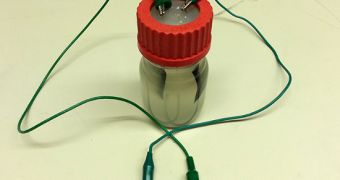Microbes that behave like miniature power plants can be used to generate electricity from sewage, scientists argue in a paper published in yesterday's issue of the journal Proceedings of the National Academy of Sciences.
In their study, the researchers explain that, whenever they digest either plant or animal waste, these so-called wired microbes produce electricity.
What's more, they say that, according to their experiments, electrodes can successfully be used to capture this electricity.
Thus, the Stanford University scientists have already succeeded in piecing together a prototype for a device that relies on these microbes to produce and harvest electricity.
Their device is basically a bottle of wastewater that houses microbes, a negative electrode and a positive one.
The microbes inside this bottle sit on the negative electrode and feast on the organic waste they share their environment with.
Whatever electricity they produce by digesting said nutrients is captured by the positive electrode, the researchers explain. “We call it fishing for electrons,” environmental engineer Craig Criddle jokes.
The microbes used in these experiments are known to the scientific community as exoelectrogenic. Unlike other organisms, they have evolved in such ways that they do not need to breathe oxygen in order to break down nutrients and turn them into biological fuel.
On the contrary, they achieve this task by reacting with oxide minerals in their environment.
By the looks of it, one such microbes-based battery is almost as effective as solar cells currently used to convert sunlight into electricity are.
Specifically, the scientists working on this project argue that it can extract some 30% of the potential energy that is locked away in wastewater.
The Stanford University researchers are hopeful that, at some point in the future, such microbes will serve to either make sewage treatment plants more environmentally friendly, or to rid so-called dead zones of organic pollutants.

 14 DAY TRIAL //
14 DAY TRIAL //